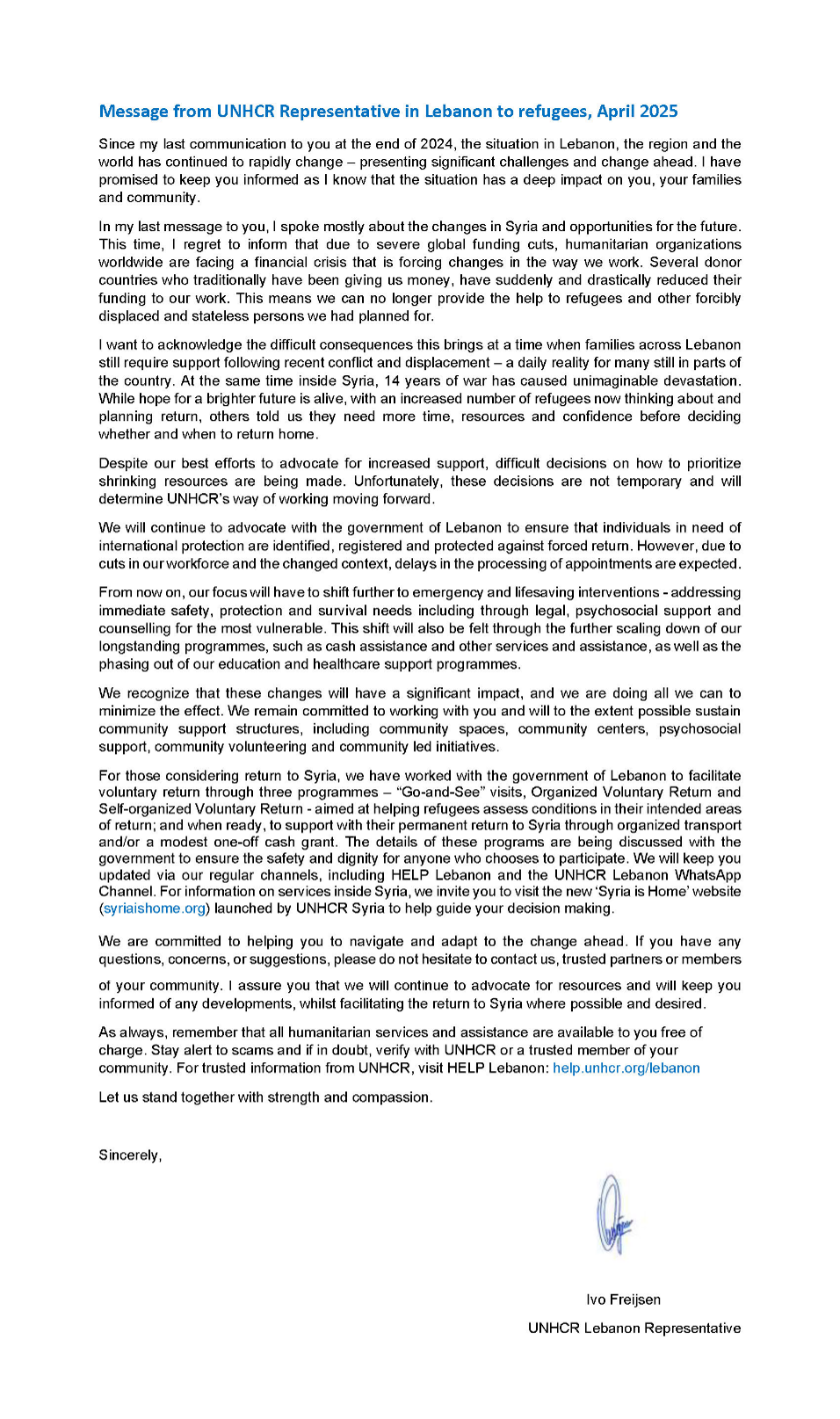📣This message is shared through UNHCR’s WhatsApp communication📣
Please be informed that UNHCR’s National Call Center is closing at 12:00pm on Thursday, 5 June, and will be closed on Friday, 6 June for Eid el Adha. We wish you a peaceful holiday.
📣This message is shared through UNHCR’s WhatsApp communication📣
Please be informed that UNHCR’s National Call Center is closing at 12:00pm on Thursday, 5 June, and will be closed on Friday, 6 June for Eid el Adha. We wish you a peaceful holiday.
📣This message is shared through UNHCR’s WhatsApp communication📣
Starting 1 December 2025, due to a global shortage in funding, UNHCR will no longer be able to provide hospitalization support for refugees residing in Lebanon. This includes maternity delivery services and acute emergency hospital admissions.
Additionally, as of this date, NextCare representatives will no longer be present in contracted hospitals, and there will be no agreements with hospitals for hospitalization of refugees known to UNHCR.
UNHCR is actively engaging with donors and health partners to advocate for and seek alternative support for refugee hospitalization where possible.
For updates, please visit: help.unhcr.org/lebanon/welcome/access-to-health-assistance
Between 4 March and 9 April 2025, UNHCR and partners* met with close to 600 women, men, youth, female-headed households, older persons and persons with disabilities covering all governorates in Lebanon. Outreach Volunteers, Disabled People Organizations and other community-based organizations were also consulted. The aim was to seek the community’s views on returns and “Go and See” visits in order to inform the design of progammes and activities. The community dialogue is one of the many ways UNHCR ensures that your feedback informs decision-making.
The report provides a summary of the feedback provided, especially around:
The report concludes with a set of recommendations that community dialogue participants suggested to UNHCR and partners.
*Al Hadatha, Al Ribat, Amel Association, Caritas Lebanon, Himaya, IOCC, INTERSOS, Makhzoumi Foundation, Nabad and SHEILD.
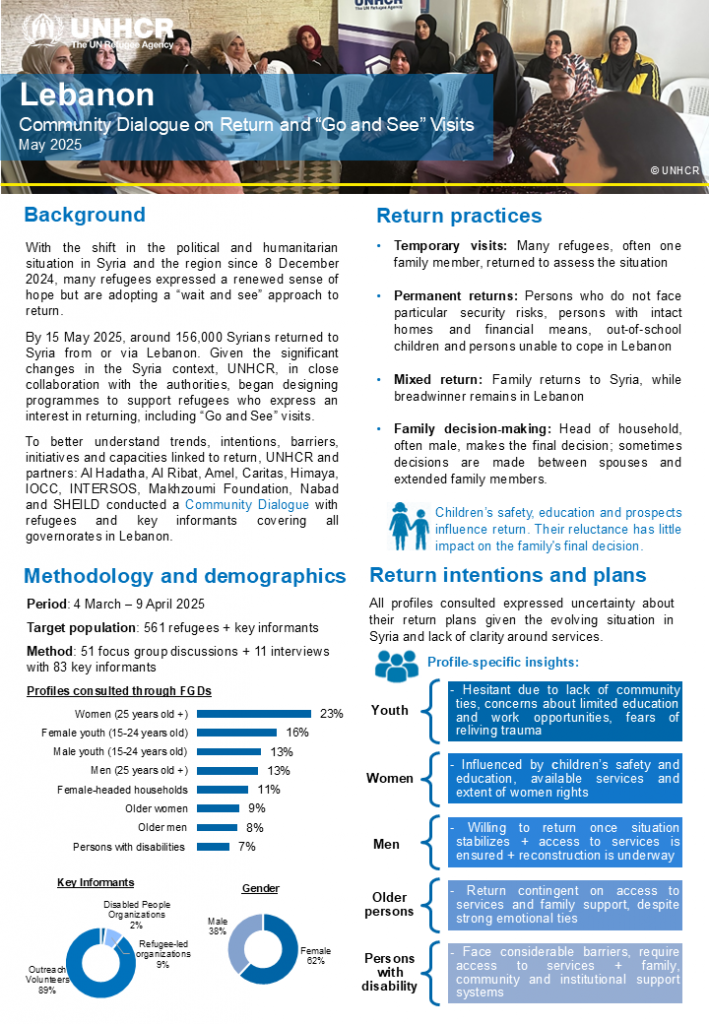
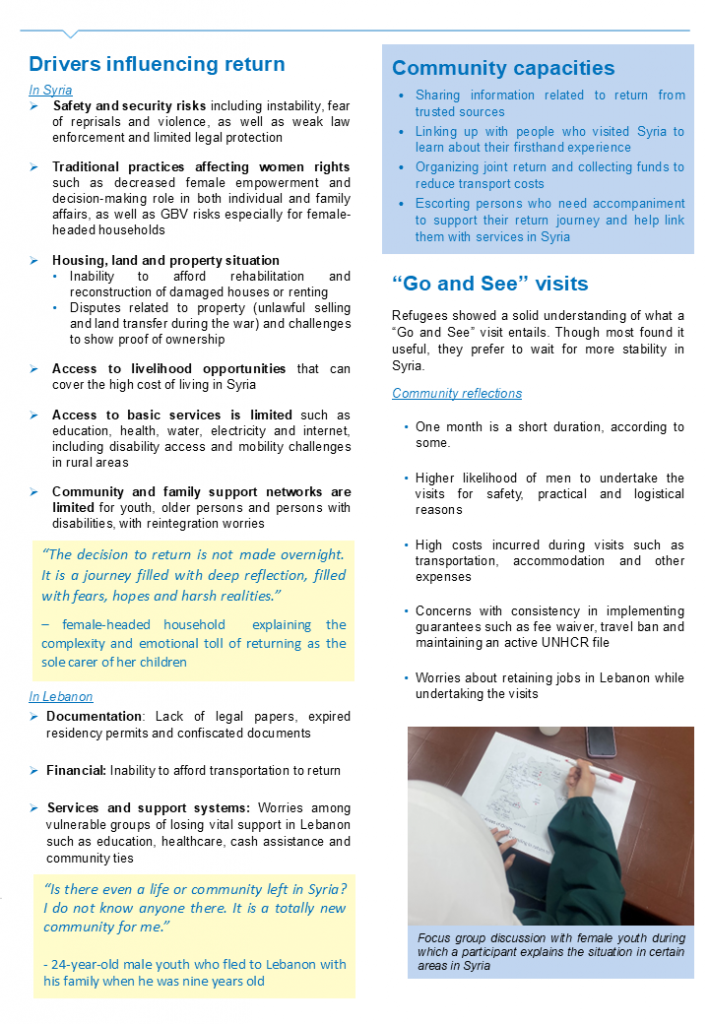
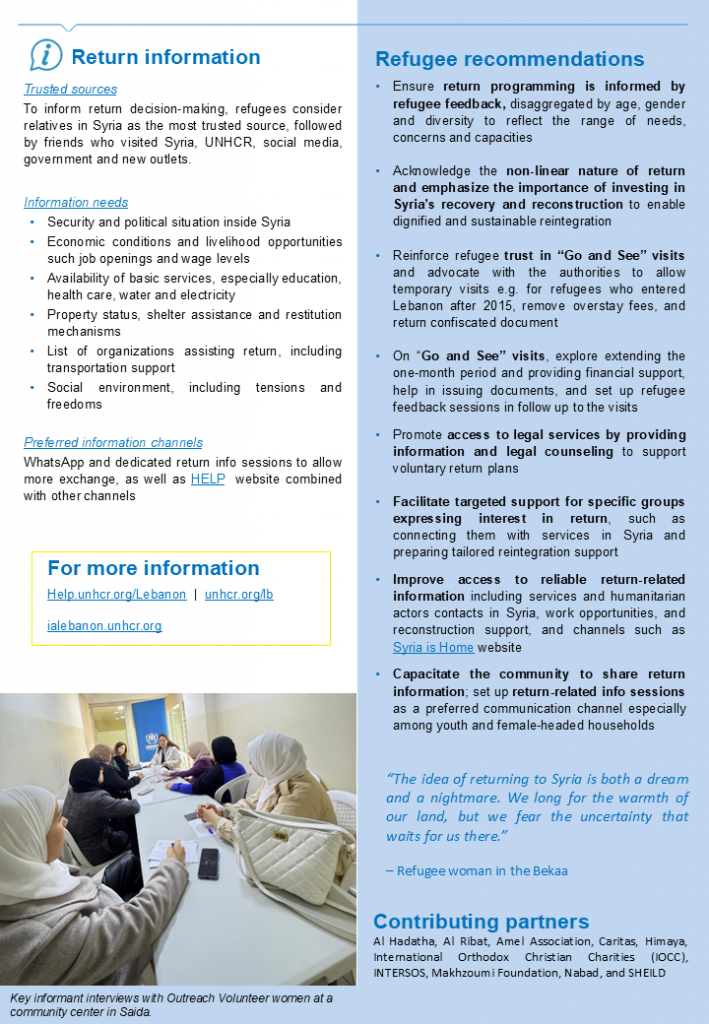
📣This message is shared through UNHCR’s WhatsApp communication📣
Have you verified your presence in Lebanon via the new My UNHCR Self-Service portal?
To maintain an active UNHCR file and continued access to services and assistance all refugees known to UNHCR in Lebanon must confirm their presence in the country within one month of receiving an SMS from UNHCR with a link (lb.myunhcr.id) to My UNHCR. If required, you can also validate your Red Card via this portal.
If you received an SMS from UNHCR but have not yet completed Presence Verification, please do it as soon as possible. You can also access My UNHCR directly through this link: lb.myunhcr.id to complete the exercise.
For more information, visit HELP Lebanon: help.unhcr.org/lebanon/presence-verification-and-card-validation
For support, you may:
· Reach out to a trusted Outreach Volunteer,
· Visit the nearest Community Development Center, or
· Call UNHCR at 04726111
‼️You must only complete Presence Verification and Card Validation if you are inside Lebanon, your GPS location will be collected as part of the process.
Protect yourself from fraud:
For step-by-step guidance on how to sign in to My UNHCR, complete presence verification and if required Red Card Validation, watch these short videos:
📣This message is shared through UNHCR’s WhatsApp communication📣
Be alert to scams involving phone calls and WhatsApp messages that promise cash assistance, prizes or other benefits in exchange for your personal information.
Keep your personal information and identification documents safe and confidential.
Only share personal information with trusted aid agencies and authorities when asked.
If in doubt: pause, reflect, and ask to verify with UNHCR or a trusted service provider.
To learn how to protect yourself from fraud, how to report fraud, and the consequences of fraud, visit HELP Lebanon: Report Fraud
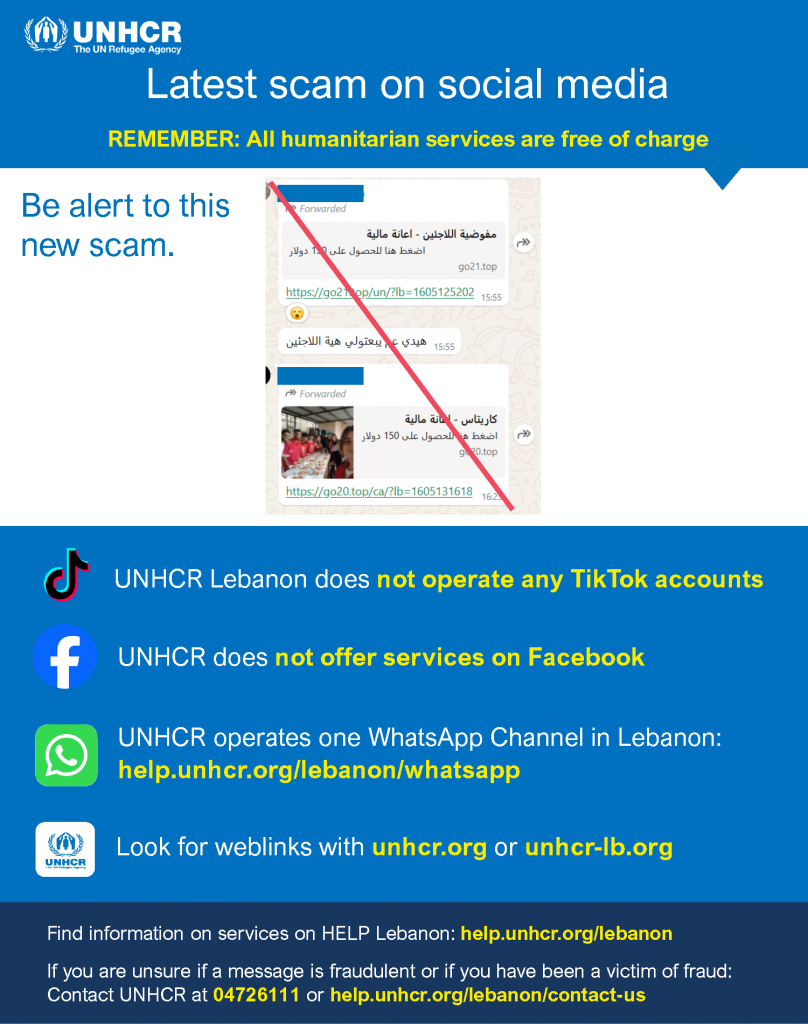
📣This message is shared through UNHCR’s WhatsApp communication📣
UNHCR has developed three short videos to guide you on (i.) how to sign in to the newly launched Self-Service Portal ‘My UNHCR’ (ii.) how to complete Presence Verification and if required (iii.) Card Validation via the portal.
Please note:
For more information on UNHCR’s Presence Verification and Card Validation exercises visit HELP: help.unhcr.org/lebanon/presence-verification-and-card-validation
How to Sign-in
How to complete Presence Verification
How to complete Card Validation
📣This message is shared through UNHCR’s WhatsApp communication📣
Be alert to scams through phone calls, SMS and social media promising assistance, resettlement, or other services. They may involve fraudsters pretending to work for a humanitarian organization and may place you at risk of exploitation or kidnapping for ransom.
Remember that UNHCR never asks for money in return for assistance or resettlement. To learn how to protect yourself from fraud, how to report fraud, and the consequences of fraud, visit HELP Lebanon: Report Fraud.
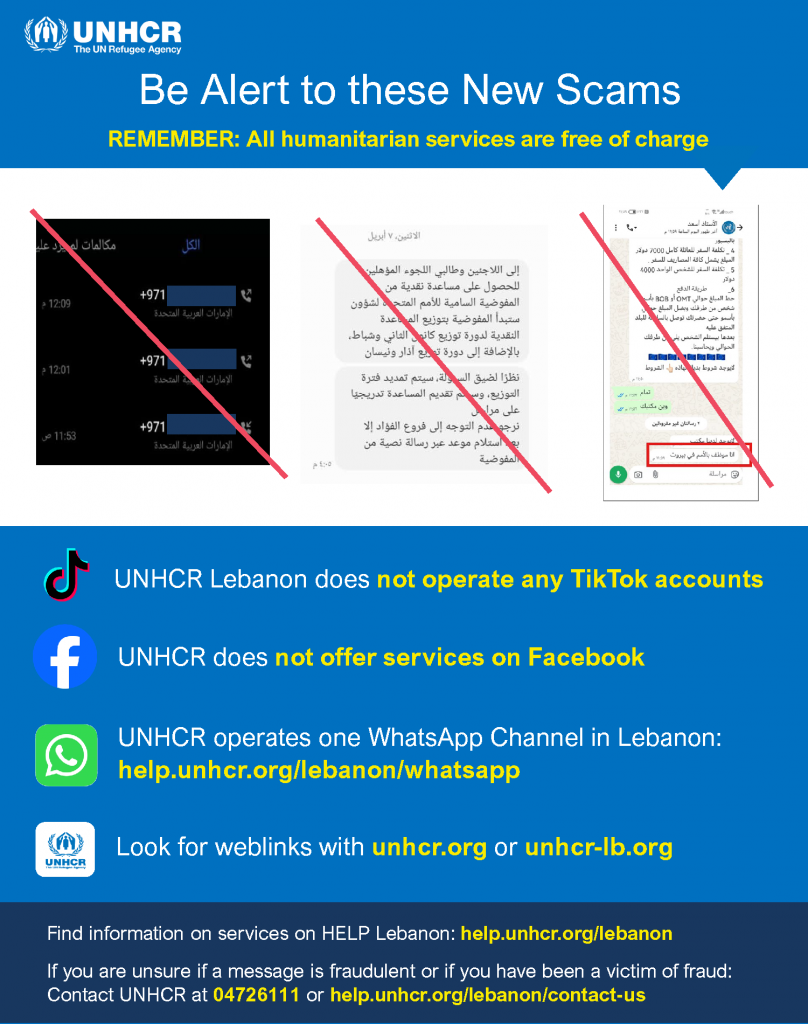
📣This message is shared through UNHCR’s WhatsApp communication📣
Please be informed that UNHCR’s National Call Center will be closed on Thursday 1 May for Labor Day.
📣This message is shared through UNHCR’s WhatsApp communication📣
Please be informed that UNHCR’s National Call Center is closing at 12:00 PM on Thursday 17 April, and will be closed on Friday, 18 April, and Monday, 21 April for Easter holiday.
📣This message is shared through UNHCR’s WhatsApp communication📣
UNHCR’s Representative has shared a message addressing the current funding crisis. To view the message, click here.
